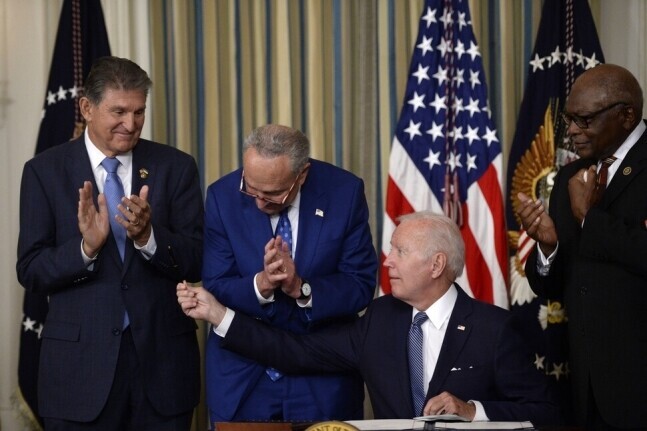hankyoreh
Links to other country sites 다른 나라 사이트 링크
Korean car, battery makers call for protective measures after US tax credit snub

Following the South Korean government’s announcement that it will proactively respond to the Inflation Reduction Act (IRA), a bill recently passed in the US that discriminates against electric cars manufactured in South Korea, industries that may be affected by the legislation are speaking up as well.
Both the automobile industry and the battery industry have requested support from the government, the former asking for export subsidies for domestic electric cars that would face discrimination in the US, the latter in order to diversify where it gets its mineral supply — which has for the most part been China.
The Korea Automotive Industry Alliance (KAIA) released a statement on Thursday, stating that “Due to the IRA, electric cars made in South Korea, which have the second largest share of the US electric vehicle market, will not be eligible for US government subsidies, which may negatively affect electric car exports of over 100,000 units annually.”
The alliance continued by requesting the South Korean government for “corporate tax cuts for companies that export electric cars to the US” and “temporary subsidies for electric car exports.”
The KAIA also suggested that the government improve the subsidy system for domestic electric car purchases by applying the principle of reciprocity. The alliance argued that just as the US made only US-manufactured electric vehicles eligible for subsidies, South Korea should also make its subsidy system for domestic electric vehicle purchases more favorable to products made in Korea.
Currently, the South Korean government subsidizes electric vehicle purchases regardless of the nationality of the car manufacturer.
During a phone call with the Hankyoreh, KAIA President Jeong Man-ki said, “As the US, in addition to China, is prioritizing electric cars made domestically, South Korea should also boldly execute a subsidy policy that’s favorable to domestic companies.”
The battery industry has yet to make any official comments. Still, companies in the industry gathered on Monday to compile a list of suggestions to make to the government. They demanded in unison that “the government strengthen support for the diversification of mineral suppliers,” as battery and materials companies argue that they lack the capacity to directly exploit mineral resources in countries other than China.
The IRA stipulates that starting next year, subsidies will be available only to companies that procure 40% or more of their battery minerals from the US or from countries that signed an FTA with the US, or to companies that procure 50% or more of their battery parts from North America.
By Ahn Tae-ho, staff reporter
Please direct questions or comments to [english@hani.co.kr]

Editorial・opinion
![[Column] Season 2 of special prosecutor probe may be coming to Korea soon [Column] Season 2 of special prosecutor probe may be coming to Korea soon](https://flexible.img.hani.co.kr/flexible/normal/500/300/imgdb/original/2024/0426/3317141030699447.jpg) [Column] Season 2 of special prosecutor probe may be coming to Korea soon
[Column] Season 2 of special prosecutor probe may be coming to Korea soon![[Column] Park Geun-hye déjà vu in Yoon Suk-yeol [Column] Park Geun-hye déjà vu in Yoon Suk-yeol](https://flexible.img.hani.co.kr/flexible/normal/500/300/imgdb/original/2024/0424/651713945113788.jpg) [Column] Park Geun-hye déjà vu in Yoon Suk-yeol
[Column] Park Geun-hye déjà vu in Yoon Suk-yeol- [Editorial] New weight of N. Korea’s nuclear threats makes dialogue all the more urgent
- [Guest essay] The real reason Korea’s new right wants to dub Rhee a founding father
- [Column] ‘Choson’: Is it time we start referring to N. Korea in its own terms?
- [Editorial] Japan’s rewriting of history with Korea has gone too far
- [Column] The president’s questionable capacity for dialogue
- [Column] Are chaebol firms just pizza pies for families to divvy up as they please?
- [Column] Has Korea, too, crossed the Rubicon on China?
- [Correspondent’s column] In Japan’s alliance with US, echoes of its past alliances with UK
Most viewed articles
- 1‘We must say no’: Seoul defense chief on Korean, USFK involvement in hypothetical Taiwan crisis
- 2Why Kim Jong-un is scrapping the term ‘Day of the Sun’ and toning down fanfare for predecessors
- 3Two factors that’ll decide if Korea’s economy keeps on its upward trend
- 4After election rout, Yoon’s left with 3 choices for dealing with the opposition
- 5BTS says it wants to continue to “speak out against anti-Asian hate”
- 6AI is catching up with humans at a ‘shocking’ rate
- 7Noting shared ‘values,’ Korea hints at passport-free travel with Japan
- 8Gangnam murderer says he killed “because women have always ignored me”
- 9South Korea officially an aged society just 17 years after becoming aging society
- 10Ethnic Koreans in Japan's Utoro village wait for Seoul's help